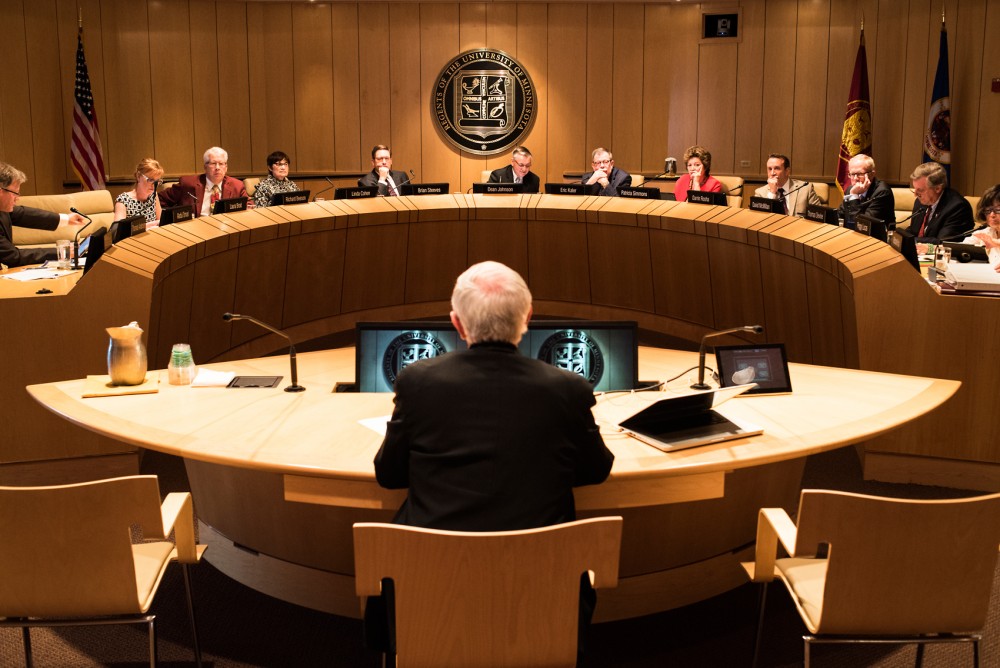The University of Minnesota’s Board of Regents will vote this week on plans to demolish 115-year old grain elevators near TCF Bank Stadium and a police union contract.
At meetings Thursday and Friday, board members will discuss several other proposals including the 2018-19 biennial budget request to the Minnesota Legislature, a campus safety update and an admissions work session.
2018-19 biennial budget request
The University will ask the state legislature for nearly $1.4 billion over the next two years if regents approve the proposal Friday.
The requests would fund efforts to improve student retention and graduation rates, grow science, technology, engineering and math programming, keep tuition from rising for Minnesota students and enhance research initiatives through Minnesota’s Discovery, Research and Innovation Economy.
The University is also requesting $8 million to supplement a loss of funding from UCare — a nonprofit health care insurer that used to provide financial support to the University — and $5 million in additional funding for the expansion of programming at the new Bell Museum and Planetarium on the St. Paul campus.
Interim Vice President and CFO Mike Volna said the legislature’s lack of a bonding bill last session delayed the payment of debt, but biennial requests come from separate state funding mechanisms and won’t be impacted too severely.
“For the most part, the relationship between a delayed capital request and our biennial budget request is pretty small,” Volna said. “It really doesn’t have a huge crossover impact.”
Regents reviewed University President Eric Kaler’s biennial budget recommendations in September and will vote to adopt the proposal at meetings on Thursday and Friday. If approved, legislators will review the requests and determine how much funding to appropriate in May.
Campus Safety
Regents will hear from Interim Vice President for University Services Mike Berthelsen Thursday about campus security and what could be done to make students safer.
Since 2013, the University has invested more than $4 million in security on the Twin Cities campus to improve building access, lighting, video surveillance and expand the student monitor program.
The University of Minnesota Police Department was the first in the state to have all its officers complete crisis intervention training. In the past ten years, the University has seen a 33 percent decline in serious crimes — like robberies and assault — on campus.
Berthelsen said that the University continuously adds new security measures when constructing or renovating buildings and the $4 million investment was partially spurred by a spike in criminal activity a few years ago.
“We said ‘we’re going to ramp up some of our investment,’” he said. “The criminal activity was primarily off-campus, but … we pay attention to security on campus and the impact of our students who are off campus.”
He said increasing security in Gopher Way tunnels and upgrading cameras are the school’s next priorities.
Minnesota Public Employees Association
The Board’s Faculty and Staff Affairs committee will take action Thursday on a collective bargaining agreement with the Minnesota Public Employee Association, which represents police officers and sergeants.
Under the agreement, employees covered by the association would get a 1 percent salary increase and a one-time payment of .5 percent of their salary upon signing the contract.
Certain employees can also get salary increases after they’ve worked for certain periods of time.
The new contract also establishes the length of time an officer can be out on vacation and sick leave.
Negotiations on the contract started in February 2016, resulting in a tentative agreement in June. The union’s contract was ratified at the end of August, but the board has to approve it Thursday before implementation.
Admissions
The University has become increasingly selective in recent years, tightening its acceptance rate from about 74 percent in 2004 to just 44 percent in 2014.
While school officials have said growing selectivity increases national ranking, some regents expressed concern that higher admission standards are pushing Minnesota students away.
“I’m as interested as anybody in terms of learning how the process works and whether we know at the end of the day if the process works,” said Regent Michael Hsu. “I hope my colleagues will be asking questions to determine … whether we’re being very efficient about the process.”
Board Chair Dean Johnson said the board has increasingly asked about the admissions process and what factors admissions counselors consider when admitting students to the University, like class rank, high school GPA and ACT scores.
Regents will hear from representatives of the admission office during a work session Thursday to get a better understanding of the process.
Nevertheless, Johnson said regents shouldn’t get too involved in micromanaging admissions.
“That’s a dangerous posture for us to take,” he said. “But we do want to have a better understanding of how it works.”
Sports Bubble and Track and Field Facility
Plans to build a new track and field facility near the Athletes Village will displace a sports bubble and recreation field, forcing the bubble to relocate to the site of the 115-year-old grain elevators near TCF Bank Stadium.
Community members and the Prospect Park Association — who think the elevators should be preserved for their historical significance — have pushed back against the University’s plan.
Regents hired third-party evaluators to assess if the abandoned elevators could be reused and found few cost-effective options to re-commission the buildings.
Following opposition from the community, school administrators included options in the demolition plan to preserve one of the elevators and restructure it at a different site, or to leave one elevator standing at the current site.
“I do believe the elevators ought to come down,” Johnson said. “I appreciate history, but at the same time we get into a cost issue here.”
The Board’s Facilities, Planning and Operations Committee will vote on a demolition plan Thursday and the full board is expected to vote on a plan Friday.








